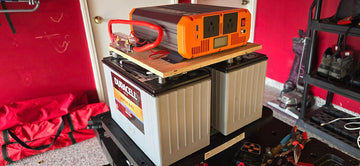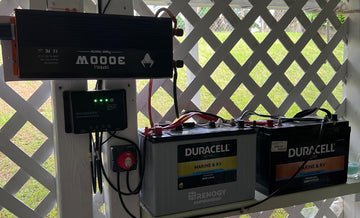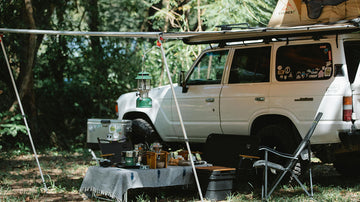Table of contents:
Introduction
On the road, we are in pursuit of freedom and adventure, enjoying every moment in close contact with nature. However, the importance of the motorhome battery as an indispensable "energy source" during this journey cannot be overstated. Batteries not only provide power for the electrical appliances in the caravan, but also ensure the normal operation of the vehicle. Therefore, how to charge the caravan battery to ensure its continuous and stable power supply during the journey has become a problem that every caravanner must face. This article aims to provide a comprehensive guide for RV travelers to help you better understand how to charge your RV battery.RV Battery Basics
Before exploring how to charge your RV battery, let's first understand the basics of RV batteries. RV batteries are mainly divided into two categories: lead-acid batteries and lithium batteries. Lead-acid batteries are the most common type of batteries in the RV market today, and they are relatively inexpensive, but they weigh more and require regular maintenance. Lithium batteries, on the other hand, offer higher energy density and longer life, but are relatively expensive. Understanding these basics will help you make a more informed decision when choosing a charging method.
Batteries work by converting chemical energy into electrical energy through a chemical reaction. During the charging process, electrical energy is converted to chemical energy and stored inside the battery. The capacity and voltage of a battery are important indicators of its performance. The capacity determines the amount of power the battery can store, while the voltage determines the output capability of the battery. Therefore, when choosing charging equipment, we need to choose the right charger according to the capacity and voltage of the battery.
Introduction of Charging Methods
1.Solar Charging
Solar charging is an environmentally friendly and economical charging method, especially suitable for RVs parked outdoors for a long time. Solar panels can convert solar energy into electricity to charge the caravan battery. When choosing solar panels, we need to consider their power, size and installation location. Also, to ensure the charging effect, we need to use a specialized solar charger to control the charging process. The advantages of solar charging are environmentally friendly, no noise and no additional fuel consumption, but the disadvantages are that it is more affected by the weather and the charging speed is slower.
2.Utility Charging
Utility charging is a convenient and fast charging method for caravans parked in places with utility power access. We can use a special RV charger to convert the utility power to DC power suitable for charging the RV battery. When choosing a caravan charger, we need to pay attention to its power, output voltage and current and other parameters to ensure the safety and efficiency of the charging process. The advantages of utility charging are fast charging speed and good charging effect, but the disadvantage is that charging needs to be carried out in places with utility access conditions.
3.Generator charging
Generator charging is a flexible and portable charging method for charging RV batteries in outdoor environments without utility power access conditions. We can choose portable generator or vehicle-mounted generator to charge the caravan battery. When choosing a generator, we need to consider factors such as its power, fuel type and noise. The advantages of generator charging are flexible and portable, not limited by location, but the disadvantages are higher noise and higher fuel consumption.
4.Vehicle engine charging
For some towable RVs or RVs with self-propelled capability, we can use the vehicle engine to charge the battery. When the vehicle is in motion, the engine generates electricity through a generator and charges the battery. This method does not require additional charging equipment, but it should be noted that during the driving process, we should ensure that the engine speed and load are moderate, so as not to affect the charging effect and vehicle performance.
Charging Equipment Selection Guide
When choosing charging equipment, we need to choose the right charger or solar panel and other charging equipment according to the type, capacity and voltage of the caravan battery. At the same time, we also need to pay attention to the power, efficiency, safety and other performance indicators of the equipment, as well as the brand's reputation and after-sales service. By comparing the performance and price of different brands and models of equipment and other factors to make a more informed purchasing decision.
Here we recommend 1200w solar panel caravan charging kit, which utilizes solar energy to charge the caravan battery.
Kit Includes:
- 12 x 100W Solar Panels
- 1 x 100A MPPT Solar Charge Controller
- 1 x Panel-Controller Cables
- 1 x Controller-Battery Cables
- 4 x Solar Extension Cables
- 1 x MMMMF+FFFFM Connectors
- 12 x Set of 4 Z-Brackets & Hardware
Safety and environmental protection during the charging process
In the charging process, we need to pay attention to safety issues, to avoid over-charging or over-discharging and other situations that cause damage to the battery or even cause safety accidents. At the same time, we also need to pay attention to environmental issues, choose environmentally friendly, energy-saving charging methods and equipment to reduce the impact on the environment. For example, when using solar charging, we can choose efficient and environmentally friendly solar panels and chargers to reduce carbon emissions; when using generator charging, we can choose low-noise, low-fuel-consumption generators to reduce environmental pollution.
Caravan Battery FAQ
Question 1: How to tell if the battery is full?
Answer: To judge whether the caravan battery is full or not, you can use the following methods:
- Observe the charging indicator: most chargers are equipped with a charging indicator, when the battery is full, the charger's green light will usually come on.
- Measure the voltage: use a multimeter to measure the battery voltage, usually a 12V battery will reach about 13V when it is fully charged. For higher voltage batteries, the voltage when fully charged will increase accordingly.
- Observe the state of the electrolyte: for lead-acid batteries, you can observe whether the electrolyte bubbles violently, which usually indicates that the battery is full.
- Judging by charging time: Knowing the capacity of the battery and the output current of the charger, you can roughly calculate the time required for the battery to be fully charged. For example, a 60Ah battery with a 6A charging current usually takes about 5 hours to fill up.
Question 2: How to avoid overcharging or overdischarging?
Answer: To avoid overcharging or overdischarging, the following measures can be taken:
- Use a smart charger: A smart charger with overcharge and overdischarge protection can automatically monitor the charging status of the battery and stop charging or discharging automatically when the battery is full or when the charge level is too low.
- Set the charging cut-off voltage: Know the specifications of the battery and the recommended charging cut-off voltage, and set the charger to automatically stop charging when the voltage is reached.
- Avoid prolonged charging: Do not leave the battery connected to the charger for long periods of time, especially if you are not using a smart charger.
- Regularly check the battery status: Use a battery tester to regularly check the health status of the battery to detect and deal with overcharging or over-discharging problems in time.
Question 3: How to choose the right charging device?
Answer: The following factors need to be considered when choosing the right charging equipment:
- Battery type and specification: Choose the right charger according to the type (e.g. lead-acid battery, lithium battery, etc.) and specification (e.g. capacity, voltage, etc.) of the caravan battery.
- Charging efficiency: Choosing a charger with efficient charging capability can shorten charging time and improve charging efficiency.
- Safety: Ensure that the charging equipment has good safety performance, including protection functions such as overcharging, over-discharging and overheating.
- Portability: For caravans that need to be charged on the move frequently, it is more convenient to choose portable charging equipment.
- Brand and after-sales service: Choose charging equipment with well-known brands and good after-sales service to ensure the quality and reliability of the equipment.
Conclusion
Through the introduction and discussion in this paper, we hope to provide RV travelers with a comprehensive and practical guide to help them better understand how to charge RV batteries. When choosing charging methods and equipment, we need to make informed decisions based on factors such as the type, capacity and voltage of the RV battery, and pay attention to safety and environmental issues. At the same time, we also need to pay attention to various situations and problems during the charging process, and take appropriate measures to cope with and solve them.


















